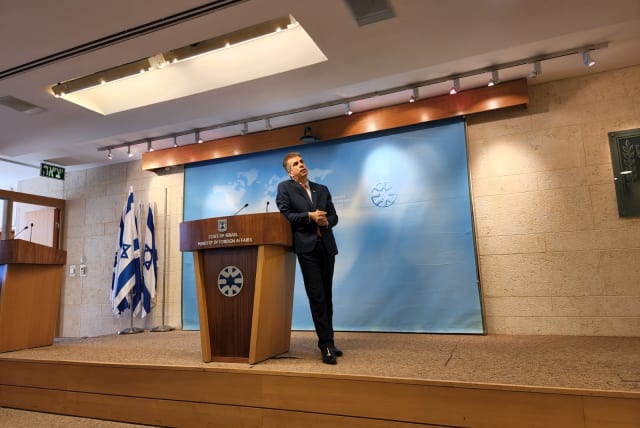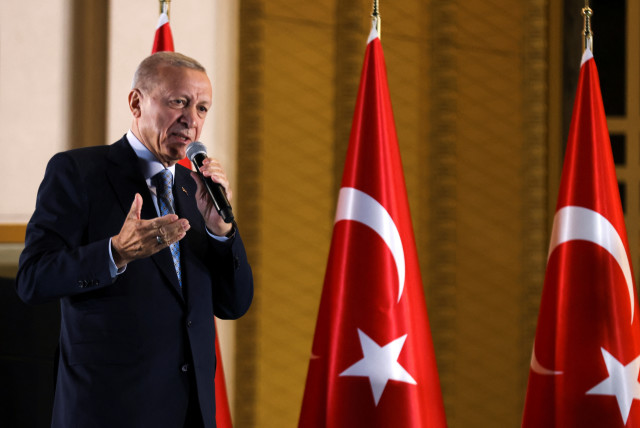Israeli foreign minister extols new era with Turkey. Then Turkey nabs alleged Mossad agents

As "a new era of relations" between Israel and Turkey seems to be dawning, recent events may complicate matters.
Against the backdrop of a large-scale Israeli military operation in the West Bank, Israeli Foreign Minister Eli Cohen briefed the Foreign Press Association in Jerusalem on Monday about Israel’s recent foreign policy achievements.
At the briefing, Cohen spoke of “a new era for the relations between Israel and Turkey,” citing Israeli involvement in disaster relief after the devastating earthquake in Turkey earlier this year. Israelis were involved in saving more than 90 lives, he said, adding that Prime Minister Benjamin Netanyahu will likely travel to Turkey to meet with President Recep Tayyip Erdogan in the coming months.
But the relationship between Israel and Turkey soon came to appear markedly less rosy. Within an hour of the announcement, Israeli media reported that the Turkish intelligence services had arrested seven people accused of working for the Mossad, Israel’s foreign intelligence agency. The Israeli reports cited the Daily Sabah, a pro-government Turkish newspaper.
Cohen's comments on IDF operation
Cohen discussed the ongoing military operation in the West Bank city of Jenin. “Due to the terror organizations and the funds they received from Iran, the Jenin [refugee] camp has become a center for terrorist activity,” he said.
He stressed that the operation is meant to target terrorist groups and not the Palestinian population as a whole: “Our fight is with the proxies of Iran in our region, which are mainly with Hamas and Islamic Jihad, which are both terrorist organizations financed by Iran.” He noted that Israel has made all necessary efforts to avoid harming civilians during the operation.
Officials from the Palestinian Authority (PA), which has partial civil control over Palestinian areas of the West Bank, including Jenin, have said that Israeli raids of this sort weaken the PA. Cohen denounced the PA for policies that incentivize terror and insisted that Israeli incursions into the West Bank were necessary to prevent the area from falling into terrorist hands.
“After we withdrew from Gaza, the 2 million people there were taken captive by a terror organization, by Hamas and Islamic Jihad,” he told The Media Line. “Therefore, we are taking all the necessary action.”
Cohen also discussed the tensions on the Israel-Lebanon border. He described the Lebanon border as a de facto border with Iran since the Iran-backed militia Hezbollah has significant control over southern Lebanon.
He stressed that reduced US sanctions on Iran would result in increased funding for Iranian proxy groups like Hezbollah. Iran’s proxy groups have also harmed Lebanon, Syria, Iraq, Gaza, and Yemen, he said.
Cohen said that a nuclear-armed Iran would be a threat not just to Israel but to the entire world.
“In Iran, there is a fanatic, radical regime that is saying clearly that it is willing to destroy Israel,” he said. Regardless of any agreement between the US and Iran, Israel will take any necessary steps, including military intervention, to prevent Iran from obtaining a nuclear weapon, the minister warned.
Cohen described the Abraham Accords and the resultant alliances in the region as a countermeasure to offset the threat of a nuclear Iran.
The Abraham Accords are a set of US-brokered agreements between Israel and four Arab nations signed in 2020 and 2021.
He said that Israel is also working to normalize its relations with Saudi Arabia. The two countries are not enemies but rather “partners for the stability that both of us wish to have in our region.” US mediation, Cohen told the reporters, would be crucial to achieving an agreement with Saudi Arabia.
“My goal is actually to expand the Abraham Accords in the next six months,” Cohen said. He noted that the next meeting of the Negev Forum would have representatives from two countries that have not yet normalized relations with Israel. The Negev Forum was established after the Abraham Accords to facilitate discussion between Israel and the countries with which it had normalized relations.
Cohen also addressed the ties between the US and Israel, which have been uncharacteristically tense. He described the relationship between the countries as “very good and strong,” despite some disagreements about the upcoming Israeli judicial reforms. Regardless of the reforms, he said, “Israel is a strong democracy, and it will remain a strong and vibrant democracy.”
Netanyahu, the minister said, is expected to receive an invitation to the White House “in the coming weeks.”
Israel has been strengthening its ties with countries around the world, Cohen said. He noted that Israel will likely open its 100th embassy this year, 75 years after the state’s establishment.
The Chadian and Azerbaijani embassies opened this year, bringing the number of embassies in Israel to 97. Papua New Guinea and “a few more countries” are expected to open embassies soon, he said.
Cohen described the opening of the Azerbaijani Embassy as a unique achievement since Azerbaijan is the first Shiite Muslim country to open an embassy in Israel.
He also predicted that additional countries would move their embassies to Jerusalem from Tel Aviv. Currently, there are four embassies in Jerusalem: those of the US, Kosovo, Guatemala, and Honduras. Cohen said he expects that number to double, with Paraguay having already announced its intention to move its embassy and other European Union countries expected to do so as well.
He noted that Israel opened an embassy in Turkmenistan this year, the closest Israeli embassy yet to Iranian territory.
Cohen discussed Israel’s stance on the ongoing war in Ukraine. “From day one of the war, Israel expressed its solidarity with Ukraine, and we support all the resolutions in the UN in regard to Ukraine,” he said. Israel has provided humanitarian aid to Ukraine and the Israeli and Ukrainian armies have cooperated around military defense, Cohen told the reporters.
“Israeli soldiers and Ukrainian soldiers are working together in Poland to implement our alert system that will save the lives of Ukrainian civilians, and there is a project of demining and other projects which we are working with Ukraine,” he said.
The situation is complicated given Israel’s ties to Russia, he explained: “Russia is an important player in the Middle East, mainly in Syria, and also there are approximately half a million Jews that are in Russia at the moment.”
Hannah Levin, a student at Northwestern University and an intern in The Media Line’s Press and Policy Student Program, contributed to this report.
Jerusalem Post Store
`; document.getElementById("linkPremium").innerHTML = cont; var divWithLink = document.getElementById("premium-link"); if (divWithLink !== null && divWithLink !== 'undefined') { divWithLink.style.border = "solid 1px #cb0f3e"; divWithLink.style.textAlign = "center"; divWithLink.style.marginBottom = "15px"; divWithLink.style.marginTop = "15px"; divWithLink.style.width = "100%"; divWithLink.style.backgroundColor = "#122952"; divWithLink.style.color = "#ffffff"; divWithLink.style.lineHeight = "1.5"; } } (function (v, i) { });

